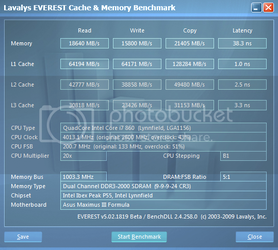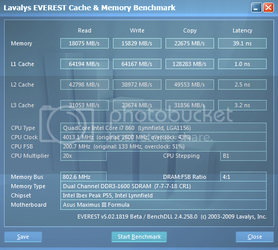Finally I can put this one to bed.
Some enthusiasts claim that because they can't run faster ram at the rated speed, that the same ram will actually perform better when downclocked - and at tighter timings. While i'm sure maybe SOME rams might behave this way, most simply will perform best when clocked at a higher frequency.
I've seen some benchmark's pulled off of Tom's hardware claiming that ram downclocked to 1600Mhz out performed the same modules clocked at 1800 and 2000. Let me just say I don't take much stock in benchmarks at tom's hardware- nor would I rely on them as gospel. I decided to run my own benchmarks, my own controlled environment, and use different software to confirm my results.
The Test Conditions:
- All benchmark's were performed right after a warm boot up.
- Each test was performed 3 times, and the best result was recorded.
- Bios was set manually, cpu clock speed remained the same, all volts remained constant.
- Cpu/NB frequency remained as close as possible no more than 50Mhz difference.
- Programs used were SiSandra, Everest, and Passmark.



There you have it, proof that 2000mhz ram is fastest when ran at it's intended speed.
Not only did it win all the tests, but it crushed the other speeds.
Some enthusiasts claim that because they can't run faster ram at the rated speed, that the same ram will actually perform better when downclocked - and at tighter timings. While i'm sure maybe SOME rams might behave this way, most simply will perform best when clocked at a higher frequency.
I've seen some benchmark's pulled off of Tom's hardware claiming that ram downclocked to 1600Mhz out performed the same modules clocked at 1800 and 2000. Let me just say I don't take much stock in benchmarks at tom's hardware- nor would I rely on them as gospel. I decided to run my own benchmarks, my own controlled environment, and use different software to confirm my results.
The Test Conditions:
- All benchmark's were performed right after a warm boot up.
- Each test was performed 3 times, and the best result was recorded.
- Bios was set manually, cpu clock speed remained the same, all volts remained constant.
- Cpu/NB frequency remained as close as possible no more than 50Mhz difference.
- Programs used were SiSandra, Everest, and Passmark.



There you have it, proof that 2000mhz ram is fastest when ran at it's intended speed.
Not only did it win all the tests, but it crushed the other speeds.
 .
.


